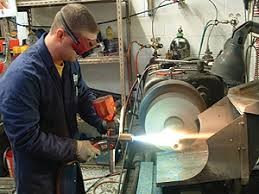Metal spraying, otherwise known as thermal spraying, is the process of covering materials in a metallic coating, often using a spray of particles that have been heated and melted.
Metal spraying is used for a variety of different purposes, from providing a coating to protect surfaces against oxidisation or other types of corrosion to helping components to retain a smooth surface.
Motor manufacturer Nissan utilises metal spraying techniques to provide a smooth finish for its engine cylinder blocks to reduce the distance between the pistons and the boreholes. This results in a more efficient engine, as drag is reduced during operation (Authority URL: ).
Different methods for different applications
A wide range of different techniques exist for metal spraying, including wire arc spraying, plasma spraying, flame spraying, detonation spraying, HVOF (high-velocity oxy-fuel coating), cold spraying and warm spraying.
The technique chosen will depend on the reason you have for spraying your parts, your budget, the timescale you have for the coating to be applied, and your preferences for the finish. For more information about spraying techniques, contact a specialist such as https://www.poeton.co.uk/standard-treatments/plasma-coatings/.
How it works
Firstly, the metal that is to be applied to your parts in the coating process must be raised to a high enough temperature to reduce it to a molten state. Once the metal has become molten, it is atomised into very small particles so that it can be sprayed onto the surface that is to be treated.
As particles hit the surface, they flatten, even and harden to produce a durable, hard and water-resistant surface. This is a permanent process, as the high temperatures and atomisation provide an instant molecular bond
Whilst metal spraying can be used for a range of purposes, its main benefits include the anti-corrosion properties it brings to a surface. As previously mentioned, engineering companies such as Nissan employ metal spraying to provide precision to their parts and to produce a consistent and durable finish.
Further advantages explored
In addition to the anti-corrosion and precision properties achievable with metal spraying, advantages of the process include the increased durability of parts and enhanced electrical properties. The hardness can be increased and coatings can be used to either increase or reduce friction on parts. Another reason why metal spraying is employed is that the deposition rate of the surface is quicker than all other coating processes.


